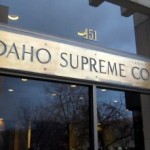 A certified question of law from the U.S. District Court for the District of Idaho was presented to the Idaho Supreme Court. Karen White and her development company, Elkhorn, LLC, sought to recover $166,496 paid to Valley County for “capital investments for roads in the vicinity of [their] White Cloud development.” Phase I of White Cloud was completed and it was undisputed by the parties that the tax monies paid for Phase I were used by the County to complete capital investments for roads in the vicinity of the White Cloud development. The County conceded that it did not adopt an impact fee ordinance or administrative procedures for the impact fee process as required by the Idaho Development Impact Fees Act (IDIFA). The County also conceded it did not enact an IDIFA-compliant ordinance, because, at the time, the County believed in good faith that none was required. Plaintiff filed suit against the County claiming that the road development fee imposed by the County as a condition for approval of the White Cloud project violated Idaho state law and deprived Plaintiff of due process under both the federal and Idaho constitutions. In her Second Amended Complaint, Plaintiff raised two claims for relief. The first claim for relief alleged that “Valley County’s practice of requiring developers to enter into a Road Development Agreement (“RDA,” or any similar written agreement) solely for the purpose of forcing developers to pay money for its proportionate share of road improvement costs attributable to traffic generated by their development is a disguised impact fee, is illegal and therefore should be enjoined.” The first claim for relief also alleged that, because the County failed to enact an impact fee ordinance under IDIFA, the imposition of the road development fees constituted an unauthorized tax. Plaintiff’s second claim for relief alleged that the County’s imposition of the road development fee constituted a taking under the federal and Idaho constitutions. The County argued Plaintiff voluntarily agreed to pay the RDA monies. Plaintiff denies that the payment was voluntary since it was required to obtain the final plat approval. The issue the federal district court presented to the Idaho Supreme Court centered on when the limitations period commences for statutory remedies made available under Idaho law to obtain a refund of an illegal county tax. The Court answered that the limitations period for statutory remedies made available under Idaho law to obtain a refund of an illegal county tax commences upon payment of the tax.
A certified question of law from the U.S. District Court for the District of Idaho was presented to the Idaho Supreme Court. Karen White and her development company, Elkhorn, LLC, sought to recover $166,496 paid to Valley County for “capital investments for roads in the vicinity of [their] White Cloud development.” Phase I of White Cloud was completed and it was undisputed by the parties that the tax monies paid for Phase I were used by the County to complete capital investments for roads in the vicinity of the White Cloud development. The County conceded that it did not adopt an impact fee ordinance or administrative procedures for the impact fee process as required by the Idaho Development Impact Fees Act (IDIFA). The County also conceded it did not enact an IDIFA-compliant ordinance, because, at the time, the County believed in good faith that none was required. Plaintiff filed suit against the County claiming that the road development fee imposed by the County as a condition for approval of the White Cloud project violated Idaho state law and deprived Plaintiff of due process under both the federal and Idaho constitutions. In her Second Amended Complaint, Plaintiff raised two claims for relief. The first claim for relief alleged that “Valley County’s practice of requiring developers to enter into a Road Development Agreement (“RDA,” or any similar written agreement) solely for the purpose of forcing developers to pay money for its proportionate share of road improvement costs attributable to traffic generated by their development is a disguised impact fee, is illegal and therefore should be enjoined.” The first claim for relief also alleged that, because the County failed to enact an impact fee ordinance under IDIFA, the imposition of the road development fees constituted an unauthorized tax. Plaintiff’s second claim for relief alleged that the County’s imposition of the road development fee constituted a taking under the federal and Idaho constitutions. The County argued Plaintiff voluntarily agreed to pay the RDA monies. Plaintiff denies that the payment was voluntary since it was required to obtain the final plat approval. The issue the federal district court presented to the Idaho Supreme Court centered on when the limitations period commences for statutory remedies made available under Idaho law to obtain a refund of an illegal county tax. The Court answered that the limitations period for statutory remedies made available under Idaho law to obtain a refund of an illegal county tax commences upon payment of the tax.
White v. Valley County
March 21, 2014 by Leave a Comment
Speak Your Mind
You must be logged in to post a comment.